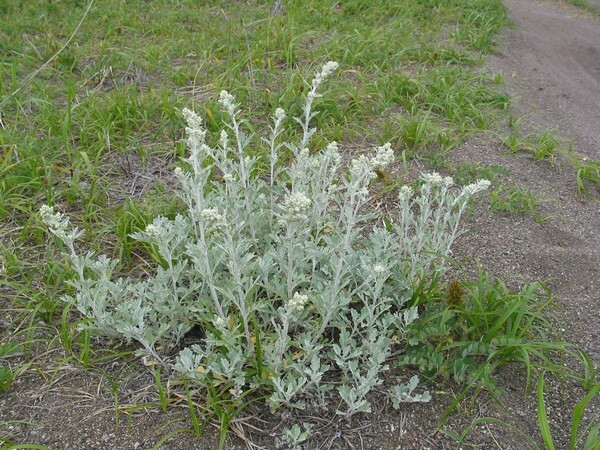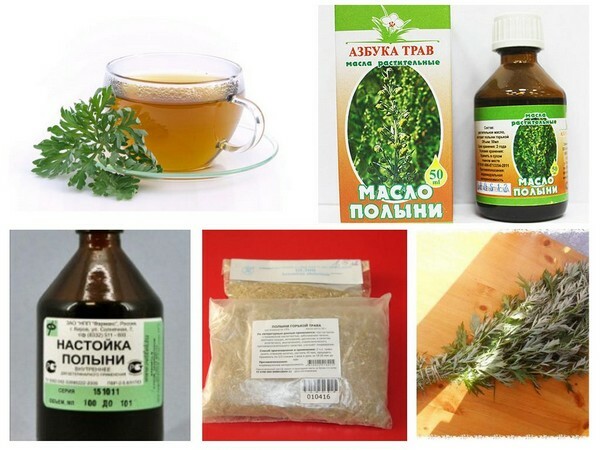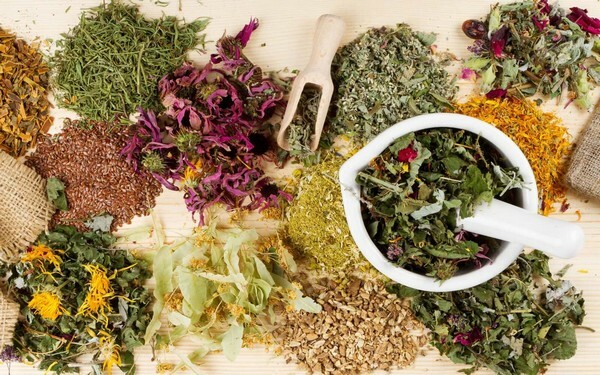- Features of the medicinal plant
- Chemical composition of the useful grass
- Pharmacological properties
- Application of the medicinal plant
- What else can be prepared from wormwood
- Contraindications
The therapeutic properties and contraindications of wormwood wormwood are directly dependent on its composition. Virtually all parts of the plant contain useful biologically active compounds. These substances can save a person from acute and chronic diseases, but with improper application, the probability of side effects is great. Tinctures, decoctions, oils from wormwood are used to treat the stomach, intestines, gall bladder. And external products with a fragrant plant will help eliminate the symptoms of allergy and dermatitis, accelerate the healing of wounds and trophic ulcers.
Features of the medicinal plant
Wormwood is a perennial herbaceous plant that can grow to 2-2.5 meters in height when grown in microelement-enriched soils. In July, it forms a lot of buds of light yellow shades. The wormwood flowers are small, soft, but the aroma they exude extends to tens of meters. It is this smell that reminds the inhabitants of the suburbs and villages that the middle of the summer has come. And by the autumn on a plant ripen round oblong seeds. Many people take the grass for a weed and ruthlessly get rid of it until the formation of fruits.
Wormwood bitter grows in the northern regions, middle and southern latitudes. On the fringes of forests and meadows, you can find whole thickets of plants, recognizable by the specific smell. Where the wormwood grows bitter still:
- South and North Africa;
- Central Asia;
- Kazakhstan;
- Transcaucasia;
- North America.
Leaves of wormwood alternate bitter, provided with short petioles, pinnately divided. You can find the plant according to the characteristic dark-silver color, which is noticeable in this photo of wormwood:

. Interestingly: Bitter wormwood is used not only in medicine, but also in cooking. For example, in Germany powder from dried plants is used as an acute-burning spice. A fragrant alcoholic drink absinthe - nothing like a well-purified spirit wormwood tincture.
When preparing wormwood for preparing infusions or ointments, you can not remove the grass along with the root. Perennial plant successfully multiplies in autumn by self-seeding. Next year it will not be necessary to search for a glade with wormwood for a long time - the grass will rise in the same place.
Chemical composition of useful grass
When studying the chemical composition of bitter wormwood, scientists found in it a significant amount of absintine, flavonoids, anabsintine, capillin, phytoncides, vitamins. These biologically active substances are contained in various pharmacological preparations used to treat the gastrointestinal tract and bronchopulmonary pathologies. Infusions and decoctions of wormwood are used as a general tonic due to the presence in the grass of such chemical compounds:
- organic acids;
- mineral salts;
- tannins.
In bitter wormwood, the content of essential oils is so great that they are isolated into a separate dosage form. Many people buy in small drugstores small bottles of dark glass, not only for treatment. With the help of essential oil of Artemisia you can aromatize the room, get rid of harmful insects - fleas, cockroaches, flies and bedbugs.
Recommendation: Cosmetologists use infusions of bitter wormwood for anti-cellulite wraps and treatment of adolescent acne. The extract of this useful plant is a part of shampoos, helping to get rid of fatty dandruff.
Pharmacological properties of
The unique composition of bitter wormwood determines the wide therapeutic range of its use.3-5 drops of essential oil neurologists recommend adding to a warm bath. After 7-10 such relaxing procedures, the person's health improves, the raised nervous excitation decreases, the articulate pain disappears. Official and folk medicine uses such medicinal properties of wormwood:
- is antispasmodic;
- antimicrobial;
- disinfectant;
- choleretic;
- is bactericidal;
- is an anti-inflammatory;
- antiulcer;
- antimycotic;
- is antispasmodic.
Infusions and decoctions of medicinal plants are used by folk healers to increase the body's resistance to viral and bacterial infections. The use of bitter wormwood in therapy not only helps to eliminate symptoms and causes of pathology. Doctors note a positive "side effect" - a significant increase in immunity. What therapeutic effects are still characteristic of wormwood:
- The wormwood capillin has a fungicidal effect, destroying pathogenic fungi. Biologically active substance has the ability to inhibit the growth and multiplication of pathogenic viruses and bacteria;
- The general strengthening property of wormwood is based on a high concentration of organic acids - apple and amber. They normalize the work of the organs of the urinary system: the kidneys, the bladder, the urethra. This causes the restoration of the water-electrolyte and acid-base balance.
Relatively recently, a high content of atabisin and arborescin gayanolides was found in wormwood wormwood. The discovery made it possible to explain the high therapeutic activity of a medicinal plant in the treatment and prevention of atherosclerosis.

Application of the medicinal plant
The use of bitter wormwood is so wide that it is difficult to find a field of medicine that does not use infusions, decoctions or alcohol tinctures from this useful plant. Grass is a part of various medicinal fees to improve digestion and increase appetite. In pharmacies, you can also purchase wormwood tincture and use it as a base for cooking potions. And for the purification of the body of parasites "Anthelminthic collection" is produced with this plant.
Warning: Use any form of bitter wormwood carefully, taking into account the diverse therapeutic properties of the herb. For example, traditional healers practice the use of plants in the treatment of insomnia. But the ability of wormwood to increase appetite can present an unpleasant surprise - by normalizing falling asleep, a person will gain a few extra pounds.
Gastrointestinal pathologies
Wormwood tea is used to treat acute and chronic gastritis. The biologically active substances contained in the plant stop the inflammatory processes in the mucous membranes, eliminate painful spasms in the epigastric region after ingestion. Prepare a healthy drink for any of these recipes:
- In a thermos pour 2 tbsp.spoons of wormwood, chamomile, St. John's wort and birch buds. Pour a liter of boiling water and insist for 3 hours, periodically shaking. After cooling the tea to room temperature, it should be filtered and the dry residue squeezed. For the treatment of chronic gastritis, infusion should be drunk a glass before each meal;
- Place 5 tbsp in an enameled container.spoons of wormwood and 3 tbsp.spoons of marigolds. Pour 5 glasses of hot water and simmer on a water bath for half an hour. Cool, strain and drink half a glass of infusion instead of coffee and tea.
The duration of the course of treatment is from one to two months, depending on the severity of the gastric pathology. If a person is diagnosed with gastritis with high acidity, you can improve the taste of tea by adding a teaspoon of thick honey.

Rehabilitation period
After chemotherapy or transferred intestinal and respiratory infections the human body is extremely weakened. To improve vitality, a balanced diet is needed. But often people do not have the strength to eat even previously favorite dishes. The composition of wormwood bitter enters hot and essential oils, excellent stimulating appetite, improving digestion. To do this, brew the grass in a special way:
- Grind 2 tbsp.spoonful of wormwood to a powdery state, add 3 tbsp.spoons of St. John's wort.
- Pour a glass of boiling water and leave for 2 hours.
- Strain and drink small sips during the day.
In the infusion, you can add honey, any jam, a slice of lime or lemon. The use of such a drink prevents the development of processes of decay and fermentation. Infusion eliminates all the symptoms of flatulence: nausea, vomiting, heartburn, belching and bloating.
Catarrhal diseases
Wormwood infusion is often used to treat viral and bacterial infections. When preparing a healing drink, flavonoids, organic acids, vitamins and microelements pass into it. Treatment of wormwood bitter contributes to the formation and separation of phlegm, facilitates attacks of dry cough, eliminates sore throat. For complete recovery, you should drink at least 4-5 cups of tea a day, which is prepared as follows:
- In a thermos pour 5 tbsp.spoons of crushed rose hips, 2 tbsp.spoons of bitter wormwood and 3 tbsp.spoons of St. John's wort.
- Fill the vegetable collection with a liter of boiling water and press for 4 hours, periodically shaking the container;
- Strain and drink a glass of tea every three hours.
Insomnia, poor falling asleep
Due to its toning effect on the body wormwood bitter is a part of medicinal fees for normalization of sleep. It helps a person to relax, calm down, become more stress-resistant. Equally important is the ability of the plant to improve peristalsis and digestion. Often a person is prevented from falling asleep excessive gassing, rumbling and bubbling in the abdomen. You can prepare a healthy drink in two ways:
- By 2 tbsp.spoonful of wormwood, balm, thyme pour 1, 5 cups of boiling water, to insist for 3 hours. Strain and drink hot aromatic tea in small sips before going to bed;
- Mix in a tablespoon of valerian and bitter wormwood, pour a glass of boiling water. Insist for about an hour, then strain and add a little flower honey. Drink tea an hour before going to bed.
These drinks help reduce high blood pressure, normalize the heart rate. Traditional healers recommend taking soothing teas with frequent dizziness.
What else can you make from wormwood
Wormwood bitter can be used not only as infusions and decoctions. Traditional healers prepare on the basis of plants and other dosage forms:
- Syrup.2 tbsp. Spoons of herbs pour a glass of boiling water and insist for a day. Strain and mix with 3 tbsp.spoons of thick honey. With helminthiasis, cholecystitis or cold, you should take a teaspoon of syrup before eating;
- Oil. Fill glass container with fresh herb wormwood, and pour with any vegetable oil. Leave for two weeks in a dark place at room temperature. After percolation, you need to lubricate the damaged areas twice a day with eczema, rheumatism, arthritis or gout;
- Alcohol tincture.5 tbsp.spoonfuls of dry herbs pour a glass of 70% ethyl alcohol. Insist a month in a dark place, shaking daily. Strain, dilute with water in equal proportions before use. Lubricate the skin with allergies, and with colds rub the soles of the feet, back and chest.
Prepare wormwood and ointment from wormwood. To do this, a tablespoon of herbs are steamed 50 ml of boiling water and insist for 24 hours. Filter and mix with 50 g of pharmacy vaseline. Healing ointment is used to treat hives and contact dermatitis.
Contraindications
The benefit of wormwood is bitter for the body due to the unique composition of the plant. But all the biologically active substances can trigger and the development of side effects. Therefore, before using infusions and decoctions should read the list of contraindications. It includes:
- the period of bearing of the child and breastfeeding;
- chronic gastric and intestinal pathologies during relapse;
- ulcerative lesions of all the organs of the digestive tract;
- individual sensitivity to the plant.
Like all medicinal herbs, wormwood is not meant for therapy of children under 12 years old. It is allowed to use ointments or oils externally, but only after consulting a dermatologist.
